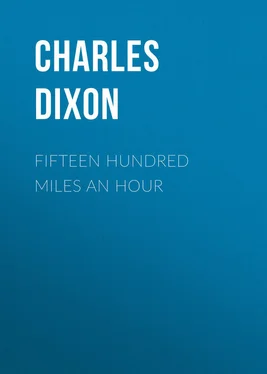Charles Dixon - Fifteen Hundred Miles An Hour
Здесь есть возможность читать онлайн «Charles Dixon - Fifteen Hundred Miles An Hour» — ознакомительный отрывок электронной книги совершенно бесплатно, а после прочтения отрывка купить полную версию. В некоторых случаях можно слушать аудио, скачать через торрент в формате fb2 и присутствует краткое содержание. Жанр: foreign_antique, foreign_prose, на английском языке. Описание произведения, (предисловие) а так же отзывы посетителей доступны на портале библиотеки ЛибКат.
- Название:Fifteen Hundred Miles An Hour
- Автор:
- Жанр:
- Год:неизвестен
- ISBN:нет данных
- Рейтинг книги:4 / 5. Голосов: 1
-
Избранное:Добавить в избранное
- Отзывы:
-
Ваша оценка:
- 80
- 1
- 2
- 3
- 4
- 5
Fifteen Hundred Miles An Hour: краткое содержание, описание и аннотация
Предлагаем к чтению аннотацию, описание, краткое содержание или предисловие (зависит от того, что написал сам автор книги «Fifteen Hundred Miles An Hour»). Если вы не нашли необходимую информацию о книге — напишите в комментариях, мы постараемся отыскать её.
Fifteen Hundred Miles An Hour — читать онлайн ознакомительный отрывок
Ниже представлен текст книги, разбитый по страницам. Система сохранения места последней прочитанной страницы, позволяет с удобством читать онлайн бесплатно книгу «Fifteen Hundred Miles An Hour», без необходимости каждый раз заново искать на чём Вы остановились. Поставьте закладку, и сможете в любой момент перейти на страницу, на которой закончили чтение.
Интервал:
Закладка:
Charles Dixon
Fifteen Hundred Miles An Hour
INTRODUCTION
The narrative contained in the papers which are given to the world in this book, is of so marvellous a character as to have made me long hesitate before venturing on their publication. Even now I do so in the full expectation of scorn and unbelief.
I owe it to the world to state exactly how these papers came into my hands. That done, I must leave it to their own appearance of truth to command belief.
The year before last, I was travelling through Northern Africa on a scientific expedition. It was early in the month of May that I reached the northern confines of the Great Desert, amongst the feathery palm-groves in the delicious oasis of Biskra.
I had started one day, with the first streak of dawn, upon a short expedition into the desert. My two Arab followers were anxious to cover as much distance as possible before the heat of the sun became oppressive.
It was about ten o'clock before we halted for breakfast, and the oasis of Biskra looked but a black spot on the northern horizon. The heavens up to now were an intensely brilliant blue, but a dark cloud far away over the distant desert could be seen rapidly increasing in size.
Gradually the whole vault of sky assumed a coppery aspect, and the sun shone paler and paler each moment. The heat and oppressiveness were almost unbearable; not a breath of air relieved the suffocating atmosphere. The sun finally disappeared behind the curtain of lowering cloud, and a darkness began to creep over the earth. The Arabs prepared for the storm which they knew from experience was brewing. The dreaded sandstorm was approaching. It came on the wings of the southern gale with terrific speed, and suddenly the air became almost as dark as midnight, full of fine blinding sand. We could not see twenty paces ahead; and now the sluggish atmosphere was stirred with the rushing and shrieking of a mighty wind.
As I gazed for one brief moment upwards during a lull in the storm, my eyes were almost blinded by a brilliant light, brighter than the flame from an incandescent lamp, and a thousand times as large, which seemed to shoot from out of space. At the same awful moment the very dome of heaven seemed cracked asunder by a loud report, different from anything I had ever heard before. It was a solid and metallic sound, louder and sharper than the report of tons of exploding nitro-glycerine. The earth shook and trembled to its utmost foundations, and the rocks seemed to recoil at the frightful explosion. The Arabs were struck dumb and motionless with horror, and I, for several moments, was as one stone-blind. With the report a huge body seemed to have struck the rocks a short distance from us, but it was impossible to tell what it was until the fury of the storm was somewhat spent. The worst was now over; and the sand, the thunder, and the darkness vanished almost as suddenly as they came. But we did not venture forth until the welcome, glorious sun shone down again upon the wet rocks; and then the Arabs engaged in fervent prayer to Allah for our miraculous deliverance from a terrible fate.
Almost the first object that my eyes rested upon, as soon as we left our retreat under the rocks, was a large round mass of dark-looking substance, a hundred yards away. In amazement I walked towards the spot where it lay hissing and steaming on the bare, wet rocks, surrounded by a thick coating of hailstones, which the hot sun was rapidly melting. It was a meteorolite of unusual dimensions, measuring exactly three feet nine inches in height, and was shaped like a huge gourd. A large crack extended completely down one side, about an inch across in its widest part.
I cautioned the Arabs to preserve the strictest secrecy, and made them swear by the Prophet's beard that they would reveal to no man what they had seen, and then we returned to Biskra. It was my intention to obtain a few suitable tools and requisites, and then return to the meteorolite at once to investigate. It would evidently take some hours to cool; besides, if we did not get back, search parties would be scouring the desert in quest of us, and they might by chance discover this wonderful "stone." I felt already that this stone belonged to me. My interest in it was all-absorbing.
Early the next morning, with three Arabs, I went off, armed with wedges, a heavy hammer, some drills, a quantity of gunpowder, and fuse. We found the stone just as we left it on the previous day, and evidently still unvisited by man.
I first of all tried to force open the crack with the wedges, but the substance was exceedingly tough, the appliances at my command very crude, and I made no progress. Then I set my followers to work to bore two holes into the "stone," and fill them with gunpowder. This plan worked admirably – the drill cutting its way through the soft spongy mass with great quickness, and I was soon ready to fire my fuse, and retire behind the rocks to wait events.
It was an anxious moment for me. We had not to wait long for the reports, which sounded like a couple of rifle cracks, and then we ran forward to examine our prize. Alas! it was shattered into fragments, some of them blown to a distance of many yards.
The charges were too strong. I was profoundly disappointed, and set the Arabs to work to gather up the largest pieces and load our camels with them.
I was sitting dejectedly enough upon the sand, more interested in the action of a pair of vultures than in the doings of my men, when Achmed, one of my Arabs, made his appearance, holding in his arms a very curious-looking fragment of the meteorolite. It looked like a rusty piece of iron ore, oblong in shape, and had evidently undergone great pressure. Examination told me that this substance was iron, and its disproportionate lightness, together with a blow from the hammer, revealed the fact that it was not solid! It looked for all the world like a large conical shot. I set off alone on my camel to the oasis, all impatient to get home and examine my prize.
I could neither eat nor sleep until I had finished my task. Locking myself in my room, I began my investigation with a singular presentiment that I was on the eve of some important discovery. Nor were my feelings unjustified by events. With the aid of a hammer and chisel, after some considerable trouble and labour, I broke open this singular-looking mass of battered rusty iron, and its strange contents rolled out on to the table! Of what were they composed? Nothing but a long and carefully-folded pile of papers – so tightly packed that they might have been under hydraulic pressure; but their appearance filled me with the intensest surprise and most utter amazement! Here and there the edges were burnt and charred, but otherwise they were in a singularly good state of preservation, and the writing upon them was almost as legible as when it was penned. The paper had evidently been made on earth, for it bore the watermark of a well-known London firm.
The most singular part of all this strange occurrence, however, remains now to be told. Most of these manuscripts were written in a good, bold, upright hand, and they were addressed and dated from
"The City of Edos, Planet of Mars, or Gathma. December the 9th, 1878."
Was I awake or dreaming? Many times did I read those three lines, walking about the room meantime to convince myself that all was reality! This strange letter from an unknown world must have been ten years in the air! These manuscripts were evidently of a scientific as well as of a popular character; and as a scientific man myself, I felt already that a bond of sympathy existed between my unknown correspondent far away out yonder beyond the sky, and myself! A voice from another world; a message from the vast unseen – how I longed to read these papers, to examine them, to revel in their secrets, and to enjoy them! What a hidden world of wonder, of adventure, of exploration, lay before me if the documents were genuine!
Читать дальшеИнтервал:
Закладка:
Похожие книги на «Fifteen Hundred Miles An Hour»
Представляем Вашему вниманию похожие книги на «Fifteen Hundred Miles An Hour» списком для выбора. Мы отобрали схожую по названию и смыслу литературу в надежде предоставить читателям больше вариантов отыскать новые, интересные, ещё непрочитанные произведения.
Обсуждение, отзывы о книге «Fifteen Hundred Miles An Hour» и просто собственные мнения читателей. Оставьте ваши комментарии, напишите, что Вы думаете о произведении, его смысле или главных героях. Укажите что конкретно понравилось, а что нет, и почему Вы так считаете.












